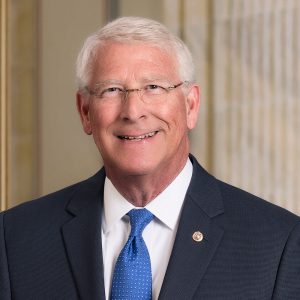
Sen. Roger Wicker
Specific programs and federally proposed legislation could help reduce the prison recidivism rates that are taking a social and financial toll on America, wrote U.S. Sen. Roger Wicker (R-MS) this week.
“Educational and vocational pathways can help offenders leave their criminal records behind while building on new opportunities in today’s thriving economy,” Sen. Wicker wrote in a Dec. 3 commentary that was published in the Tupelo, Miss.-based Daily Journal.
“More than 95 percent of the Americans currently incarcerated will eventually be released from prison,” the senator commented. “Our society is better off as a whole if these individuals return to normal lives when they go home.”
Prior to the November midterm elections, Sen. Wicker participated in a roundtable discussion in Gulfport, Miss., convened by President Donald Trump to highlight reform opportunities to the United States criminal justice system. Vice President Mike Pence, U.S. Sens. Lindsey Graham (R-SC) and Cindy Hyde-Smith (R-MS), Mississippi Gov. Phil Bryant, a Republican, and other leaders also attended to determine forward-looking reforms.
“The need for prison reform stems from troubling recidivism rates, in which criminal behavior is repeated after a prisoner serves his or her sentence,” wrote Wicker, citing 2016 U.S. Bureau of Justice statistics showing that almost half of federal prisoners who receive community supervision get re-arrested within five years.
State-level recidivism numbers “were even worse,” he wrote, “with 77 percent of state prisoners re-arrested in the same time period.”
Sen. Wicker, who said he sides with President Trump in supporting a strong judicial system that holds criminals accountable and enforces the law, noted that the nation “cannot ignore the pervasive social and financial costs of crime, as well as our responsibility to address these challenges in our communities.”
Alternative sentencing and second-chance employment can help, he said, by putting the focus on much-needed rehabilitation for prisoners who exit the system.
“High recidivism rates reflect the difficulties that many prisoners experience when reentering society,” Sen. Wicker wrote. “At the roundtable, the president heard from Mississippians who work in law enforcement, our courts, our prisons, and our faith communities about the need to help these individuals get back on their feet.”
In addition to cost savings, such efforts are equally vital for ensuring safe, drug-free communities, he said.
“For example, with support of private industries and job training in prison, individuals who pose no risk to others can find meaningful work in their communities after being released. With the proper drug rehabilitation, they can overcome problems with substance abuse,” wrote the lawmaker, a long-time supporter of his home state’s drug court programs, which utilize strict judicial supervision and mandatory drug tests rather than jail time to help nonviolent drug offenders regroup and start over.
“As the opioid epidemic continues in our nation, programs like drug courts are more and more important,” Sen. Wicker added.
In Congress, the senator hopes to see the U.S. Senate advance the U.S. House-approved Formerly Incarcerated Reenter Society Transformed Safely Transitioning Every Person (FIRST STEP) Act, H.R. 5682/S. 3649. The measure would authorize programs to help reduce the risk that prisoners will recidivate upon release from prison, according to the text of the bills in the congressional record.
Specifically, the bipartisan bill would amend the federal criminal code to direct the U.S. Department of Justice to establish a risk and needs assessment system to assess and classify the recidivism risk of prisoners; to guide housing, grouping and program assignments; and to incentivize and reward participation in and completion of recidivism reduction programs and productive activities, according to the congressional record summary.
“The legislation has the support of the Trump administration,” Wicker pointed out, “and would incentivize prisoners to demonstrate good behavior and work toward job skills.”
H.R. 5682, passed on May 22 by the House, 360-59, has 19 cosponsors. S. 3649 has 25 cosponsors. The Senate on Nov. 26 placed the proposal on its legislative calendar.



